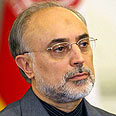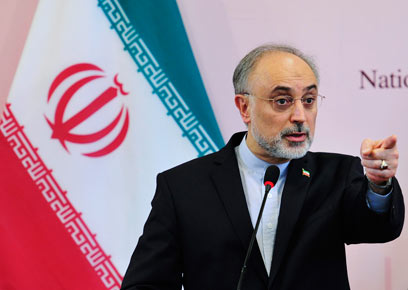
Ali Akbar Salehi
צילום: AFP
ISIS links Iranian FM to past nuclear program
US nuclear expert says Ali Akbar Salehi was instrumental in initiation of Tehran's disputed atom work back in the 1990s
Washington – Communications from the 1990s suggest Iran's current foreign minister, Ali Akbar Salehi, had knowledge of a program to procure goods for an alleged clandestine nuclear program when he was head of a university, a US nuclear expert said on Tuesday.
David Albright, founder of the Institute for Science and International Security (ISIS), said among 1,600 telexes and other material he has obtained and is studying was a letter signed by Salehi as head of Sharif University in 1991.
Related stories:
- Iran nucelar talks to continue
- Drawing focuses on Iran's nuke work
- EU tells Iran it 'must' suspend atom activity
The letter served as an end-user guarantee to a European supplier of materials that could have a dual purpose for use in a nuclear program. Tehran-based Sharif University, however, was acting essentially as a front for Iran's military procurement network, Albright said.
"Salehi knew about or was involved in efforts to create an alleged parallel military nuclear program that is of great interest to the IAEA now," said, referring to the International Atomic Energy Agency, the United Nations' nuclear watchdog.
"And the intention of that program was probably to make nuclear weapons, including producing highly enriched uranium," Albright said.

Instrumental? Ali Akbar Salehi (Photo: Reuters)
While senior IAEA officials have said in the past that they suspected Salehi and Sharif University played a role in such procurement activities, the telexes appear to be the first public evidence supporting those suspicions.
ISIS' findings come as Iran and the IAEA ended two days of talks and were to meet again next week, just days before negotiations between Iran and world powers in Baghdad.
The West is concerned Iran's nuclear program may be aimed at developing nuclear weapons, a charge Tehran denies.
Murky front
US intelligence agencies have said Iran halted its efforts to construct a nuclear device in the fall of 2003, while continuing with research and uranium enrichment.
ISIS said the Physics Research Center had used Sharif University "as a front" for buying certain goods overseas and hid "the true end use from overseas suppliers by providing an educational rationale for the purchases."
The telexes showed that while the initial order came from the university's purchasing department, when finalizing payments, the Physics Research Center and its chief, Sayyed Abbas Shahmoradi-Zavareh, appeared in financial-related telexes as the responsible party.
ISIS said it has a copy of a letter signed by Salehi as head of Sharif University in 1991 that, along with associated telexes, demonstrated he was aware of the Physics Research Center purchases of dual-use goods.
The letter certified that the goods would be used for university teaching or research and not for making weapons or ammunition.
ISIS also linked Salehi to the Physics Research Center by saying that when he was head of the univerisity two packages could not be delivered to Shahmoradi at the university and the deliverer was told to redeliver them to the puchasing manager at the university or Salehi.
Telexes implied that Salehi knew of the procurement of whole body counters, used to measure radiation, and had a connection to Shahmoradi, ISIS said.
- Receive Ynetnews updates directly to your desktop










